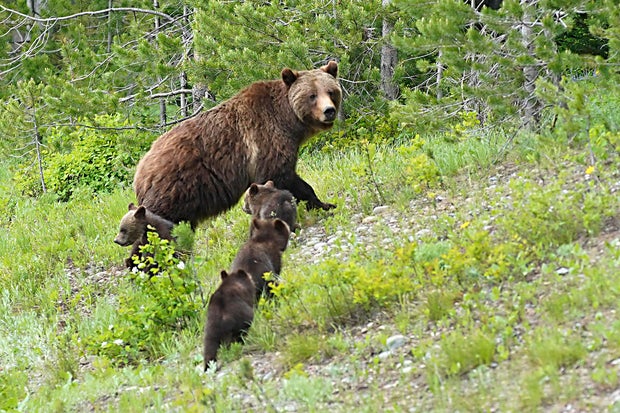A grizzly bear who accidentally inflicted himself with a burst of pepper spray while attacking a hiker in Grand Teton National Park in Wyoming will not be captured or killed because it may be trying to protect a cub, park officials said in a statement.
While attacking a hiker on Signal Mountain, the grizzly bear bit the man’s can of bear repellent and was hit by a volley, causing the animal to flee. The 35-year-old Massachusetts man who pretended to be dead while being bitten managed to escape and spent Sunday night in the hospital.
There was no word on when Signal Mountain or a road and trail to its 7,700-foot (2,300-meter) summit would reopen after being closed because of the attack. These closures are typical after the few violent attacks on public lands in the Yellowstone region each year.
The decision not to pursue the bears, which authorities determined behaved naturally after being surprised, was also consistent with attacks that do not involve raids on campsites, eating food left out by people or similar behaviors that make the bears more dangerous.
Rangers track and study many of the approximately 1,000 bears in the Yellowstone region, but were unfamiliar with those responsible for Sunday afternoon’s attack, according to the statement.
The attack happened even though the victim was carrying bear repellent spray and making noise to warn bears in the forest, the statement said.
Speaking to rangers later, the man said he found a small bear that ran away from him. As he picked up his bear repellent, he saw a larger bear attacking him in his peripheral vision.
He didn’t have time to use the bear spray before he fell to the ground with his fingers clasped behind his neck and one finger holding the spray.
The bear bit him several times before biting into the can of pepper spray, which burst and drove the bears away.
The man arrived at an area with cell phone coverage and called for help. A helicopter and then an ambulance evacuated him to a nearby hospital.
Images by George Frey/Getty
Investigators suspect from the man’s description that the smaller bear he saw was an older cub belonging to the female grizzly bear that attacked. Mother bears aggressively defend their cubs and remain with them for two to three years after birth.
Park officials did not release the name of the victim. He was expected to make a full recovery.
Recent grizzly attacks
The attack in Grand Teton National Park came just days after a man in Canada suffered “serious injuries” after being attacked by a grizzly bear while hunting with his father.
Last fall, a Canadian couple and their dog were killed by a grizzly bear while backpacking in Banff National Park. A few weeks before that, a hunter in Montana was severely attacked by a grizzly bear.
Last July, a grizzly bear fatally attacked a woman on a forest trail west of Yellowstone National Park. The bear was later euthanized after breaking into a home near West Yellowstone in August.
Also that month, a 21-year-old woman who planted trees was seriously injured by a bear in British Columbia. Canadian authorities were unable to locate the animal, but believe it was a grizzly bear that attacked the woman.
Grizzly bears in the contiguous 48 states are protected as endangered speciesaccording to the U.S. Fish and Wildlife Service.
Last month, the US National Park Service announced it was launching a campaign to capture grizzly bears in Yellowstone Park for research purposes. The agency urged the public to avoid booby-trapped areas, which would be clearly marked























